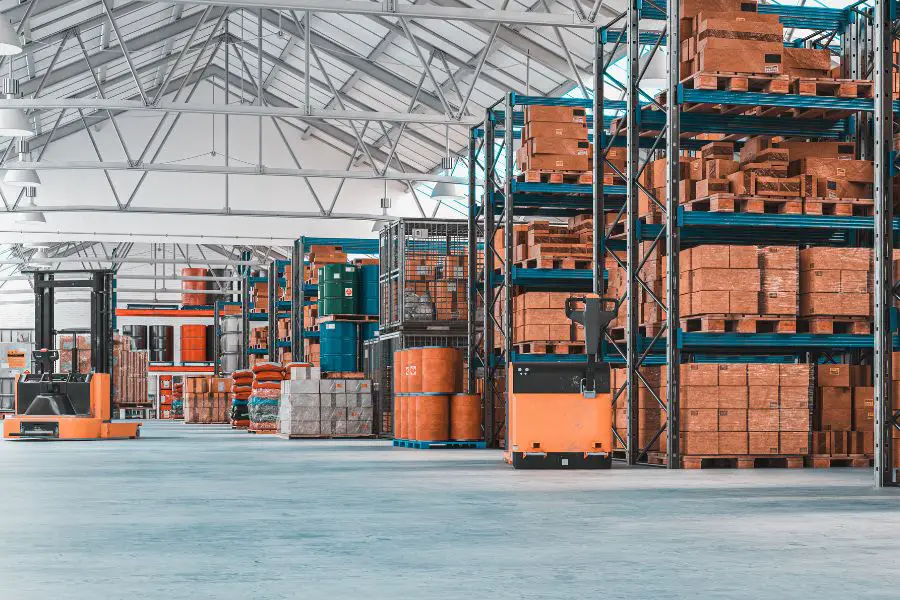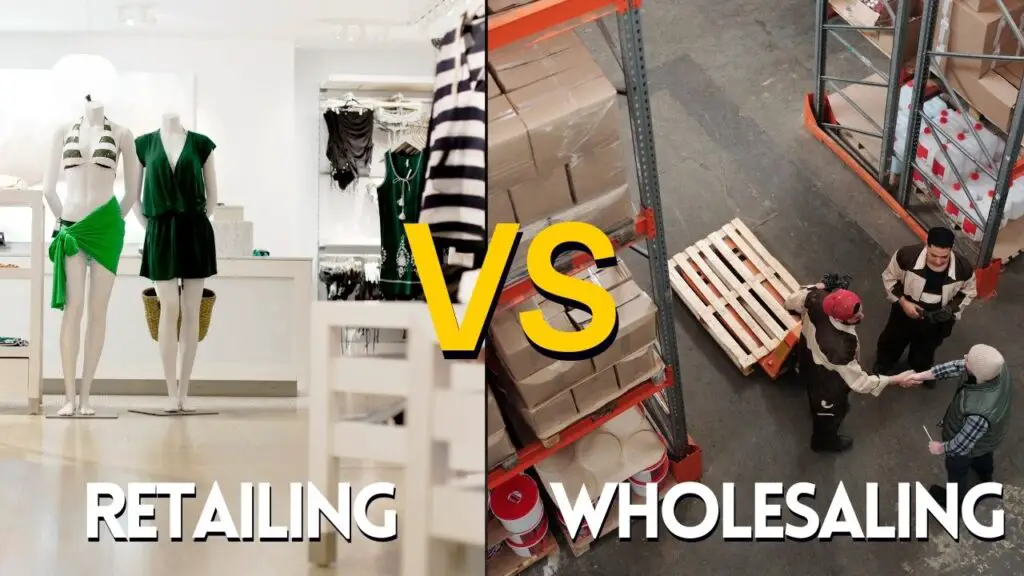Disclaimer: We sometimes use affiliate links in our content. For more information, visit our Disclaimer Page.
When it comes to retailing vs wholesaling, it is important to understand the key differences between these two types of businesses. Retail and wholesale businesses operate in different ways, catering to different clients and employing unique strategies for success. This blog post will explore the differences between retailing and wholesaling, touching on their respective business models, supply chains, and customer bases.
The Retail Business Model

Defining Retail Businesses
A retail business sells goods directly to consumers, typically in smaller quantities. Retail businesses can take many forms, such as brick-and-mortar shops, online stores, or a combination of both. Examples of retail businesses include grocery stores, convenience stores, department stores, and specialty stores.
How the Retail Business Model Works
The retail business model involves purchasing goods from wholesalers or manufacturers at a wholesale price and selling them to end users at a higher price, known as the retail price. Retailers sell products to customers in small quantities and aim to provide a convenient shopping experience for consumers.
Retail Industry and Retail Stores
The retail industry encompasses various types of retail stores, each catering to a specific market segment. Department stores, for example, offer a wide range of products, while specialty stores focus on a particular brand or product type. Grocery stores and convenience stores sell food and household items, while discount stores offer products at lower prices.
Retail Business Model: Strategies and Challenges
Retail businesses face many challenges, including attracting customers, managing inventory, and maintaining a strong brand identity. Retailers must develop a retail strategy that meets the needs of their target market and differentiates them from competitors. This may involve investing in marketing, store design, and customer service. Retailers also need to manage their expenses, such as rent, utilities, and staffing, which can be higher than those of wholesale businesses.
The Wholesale Business Model

Defining Wholesale Businesses
A wholesale business is one that sells goods to other businesses in large quantities rather than directly to consumers. Wholesalers sell products to retailers, who then sell the goods to end users. Wholesale businesses can operate in various forms, such as merchant wholesalers, limited service wholesalers, and wholesale suppliers.
How the Wholesale Business Model Works
The wholesale business model involves purchasing goods in bulk from manufacturers and selling them to other businesses at a higher price, known as the wholesale price. Wholesale businesses typically sell goods in large quantities, allowing them to offer lower prices to their clients. In turn, retailers purchase goods from wholesalers to stock their stores and sell to consumers.
Wholesale Vs Retail: Supply Chain and Sales Channels
Both wholesale and retail businesses play crucial roles in the supply chain. Wholesalers act as intermediaries between manufacturers and retailers, ensuring that products are distributed efficiently and effectively. Wholesalers may also engage in other activities, such as providing storage, transportation, and marketing services to their clients.
Wholesale Business Model: Strategies and Challenges
Wholesale businesses face different challenges than retail businesses, such as managing inventory, forming business partnerships, and expanding into global markets. Wholesalers must build strong relationships with manufacturers and retailers, ensuring that they can source products at competitive prices and sell them to clients at a profit. Wholesalers may also need to navigate complex international trade regulations and shipping costs when selling internationally.
Related: Lean Management
Comparing Retail and Wholesale Businesses

Key Differences Between Retail and Wholesale Businesses
Retail and wholesale businesses differ in several ways, including their target markets, sales channels, and business models. Retail businesses sell directly to consumers, while wholesale businesses sell to other businesses. Retailers purchase goods from wholesalers or manufacturers and sell them to end users, while wholesalers buy products from manufacturers and sell them to retailers.
Retail vs Wholesale: Pricing and Profit Margins
One of the most significant differences between retail and wholesale businesses is their pricing structure. Retailers typically sell goods at a higher price than wholesalers, as they need to cover various expenses, such as rent, utilities, and marketing costs. In contrast, wholesalers sell products at a lower price, as they deal in large quantities and have lower overhead costs.
Profit margins also differ between retail and wholesale businesses. Retailers generally have higher profit margins, as they sell goods to end users at a higher price. However, they also face higher expenses, which can reduce their overall profitability. Wholesalers, on the other hand, have lower profit margins as they sell goods at a lower price to retailers. However, their expenses are typically lower, which can result in higher overall profitability.
Retail vs Wholesale: Customer Base and Relationships
Another key difference between retail and wholesale businesses is their customer base. Retail businesses primarily cater to individual consumers, often focusing on building a strong brand identity and attracting customers through marketing and advertising. Retailers may also invest in creating a personal connection with their customers, providing tailored shopping experiences and engaging with customers face-to-face.
Wholesale businesses, on the other hand, focus on building relationships with other businesses. Their clients are typically retail businesses, such as department stores, grocery stores, and specialty stores. Wholesalers need to establish strong business-to-business relationships to ensure they can source products at competitive prices and maintain a steady flow of clients.
Retail vs Wholesale: Inventory Management and Order Size
Inventory management is another area where retail and wholesale businesses differ. Retailers typically purchase goods in smaller quantities, as they need to manage their inventory carefully and ensure they have enough stock to meet consumer demand. This can be a challenge for retail businesses, as they must balance the need to maintain a diverse product range with the risk of holding too much inventory.
Wholesalers, in contrast, deal in bulk quantities, purchasing large amounts of goods from manufacturers and selling them to retailers. This allows wholesalers to take advantage of economies of scale, obtaining products at lower prices and passing those savings on to their clients. However, wholesalers must also manage their inventory carefully, ensuring they have enough stock to meet the needs of their retail clients while avoiding overstocking.
Examples of Retail and Wholesale Businesses
Retail Examples
Retail businesses can take many forms, from brick-and-mortar shops to online stores. Examples of retail businesses include:
- Department stores, such as Macy’s or Nordstrom
- Grocery stores, like Kroger or Safeway
- Specialty stores, focusing on a particular product category or brand
- Convenience stores, such as 7-Eleven or Circle K
- Discount stores, like Walmart or Target
- Online retailers, like Amazon or eBay
Wholesale Examples
Wholesale businesses also vary in size and scope, serving different industries and markets. Examples of wholesale businesses include:
- Merchant wholesalers, who purchase goods from manufacturers and sell them to retailers
- Limited service wholesalers, who offer specialized services, such as storage or transportation, to their clients
- Wholesale suppliers, who provide goods to specific industries or markets
Conclusion: Retail and Wholesale Businesses in Today’s Economy
In conclusion, retail and wholesale businesses play essential roles in the global economy, providing goods and services to consumers and businesses alike. While retail businesses focus on selling goods directly to end users, wholesale businesses sell products to other businesses in large quantities. Both types of businesses face unique challenges and opportunities, with different business models, pricing structures, and customer bases.
Understanding the key differences between retail and wholesale businesses can help entrepreneurs, business owners, and consumers make informed decisions when navigating the complex world of commerce. Whether you are a shopper looking for the best deals or a business owner seeking to expand your operations, recognizing the distinctions between retail and wholesale businesses can provide valuable insights and help guide your decision-making process.
As the retail and wholesale industries continue to evolve, businesses must adapt to changing consumer preferences, market trends, and technological advancements. Retail businesses must focus on providing personalized shopping experiences, maintaining a strong brand identity, and investing in digital channels to attract customers. Meanwhile, wholesale businesses need to build strong business-to-business relationships, manage inventory effectively, and expand into global markets to remain competitive.
In today’s rapidly changing business landscape, both retail and wholesale businesses must continue to innovate, adapt, and grow to meet the needs of their customers and succeed in the marketplace. By understanding the unique challenges and opportunities faced by retail and wholesale businesses, entrepreneurs, business owners, and consumers can make informed choices and contribute to a vibrant and dynamic global economy.





